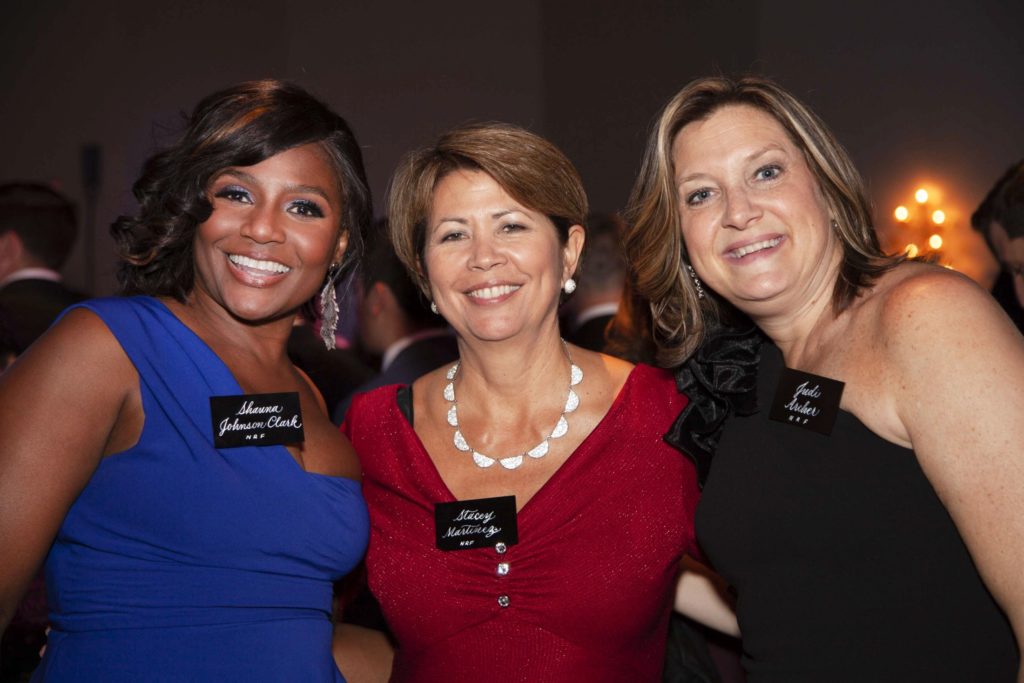
(From Left) Norton Rose Fulbright Global Chair Shauna Clark, US COO Stacey Martinez, US Hiring Partner Judith Archer
Shauna Clark remembered the isolation of being the only African American woman in the employment law practice at Fulbright & Jaworski – now Norton Rose Fulbright – when she told the law firm’s managing partner in 2010 that he needed to meet a young Black attorney in their bankruptcy practice.
The leader said his schedule was tight and he didn’t have the time. Clark pushed back, refusing to take “no” as the answer.
A few days later, the managing partner and Travis Torrence, who was a fourth-year associate at the time, met for breakfast at Quattro’s the Four Seasons.
“That was a critical point in my career, and Shauna arranging that meeting was sponsorship in action,” said Torrence, who is now a senior counsel and leader in the Shell Oil legal department. “Shauna took a direct interest in my career. She put me and my work on the radar of the firm’s leader, and she did so many things to help me be successful at my job.”
Torrence and Clark are exhibits one and two for Norton Rose Fulbright, one of the largest law firms in the world, in making the argument that sponsorship – not to be confused with mentoring – is a critical element to achieving increased diversity and inclusion in an historically white male dominated legal profession.
No international corporate law firm has achieved as much diversity in its leadership ranks as Norton Rose Fulbright, which is the second largest law firm operating in Texas.
Just as impressive, the firm’s focus on diversity and inclusion has coincided with significant increases in revenues and profits for the firm’s Texas lawyers, as corporate general counsel say that diversity plays a significant role in their decisions about hiring lawyers and firms.
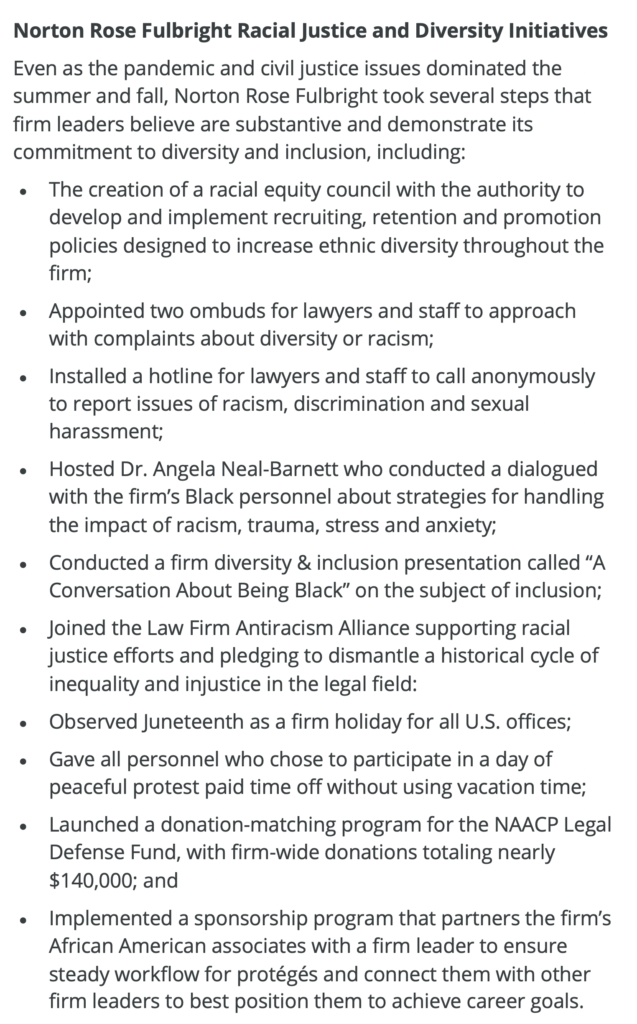
“It is my impression that Norton Rose Fulbright has had greater success in both recruiting and retaining diverse talent than many other law firms,” said Phillips 66 General Counsel Paula Johnson. “I’m a firm believer that success breeds success. There is no greater tool in recruiting diverse talent than having diverse recruiting teams.”
“Diverse teams create superior results, and there is no substitute for the differences in perspective that diverse teams bring to a problem,” Johnson told The Texas Lawbook.
Corporate law firms across Texas have struggled for decades to increase the glaringly low number of women and ethnic minorities in their ranks. Most law firms, including Norton Rose Fulbright, readily admit that their prior efforts achieved minimal success.
Most large commercial law firms average between 25% and 40% of their lawyers being women and between 10% and 20% being lawyers of color, according to the American Bar Association.
Norton Rose Fulbright, which has more than 3,200-lawyers in 52 offices worldwide, reports that 33% of its 212 Houston lawyers are women and about 15% are ethnic minorities.
But leaders at Norton Rose Fulbright, which has its second and third largest U.S. offices in Houston and Dallas, respectively, say that their older, more experienced partners’ professional sponsorship of younger women attorneys and lawyers of color is already witnessing significant successes.
The statistics seem to support this.
- Nineteen of the 27 baby lawyers who joined Norton Rose Fulbright in Texas straight out of law school in 2020 were women or lawyers of color.
- More than half of the summer associates at the law firm in 2020 were women or ethnic minorities.
- Six of the 11 associates promoted to partner in 2020 were women or attorneys of color.
- Sixteen women partners sit in significant leadership positions, ranging from practice group leaders and hiring partnership committee members to heads of the firm’s offices across the country.
- Four of the nine members of Norton Rose Fulbright’s management committee are women – one is African American, one is Asian American and one is Hispanic American.
Just last month, Norton Rose Fulbright announced that Debra Gatison Hatter, an African American corporate securities expert who is a board member of the Greater Houston Women’s Chamber of Commerce, joined the firm as a partner.
“It is not surprising that Fulbright is leading the way,” said Torrence, who is a faithful client of his old firm. “The fact that [Norton Rose] Fulbright has multiple women on its management committee demonstrates in concrete measure that diversity in leadership can be achieved.”
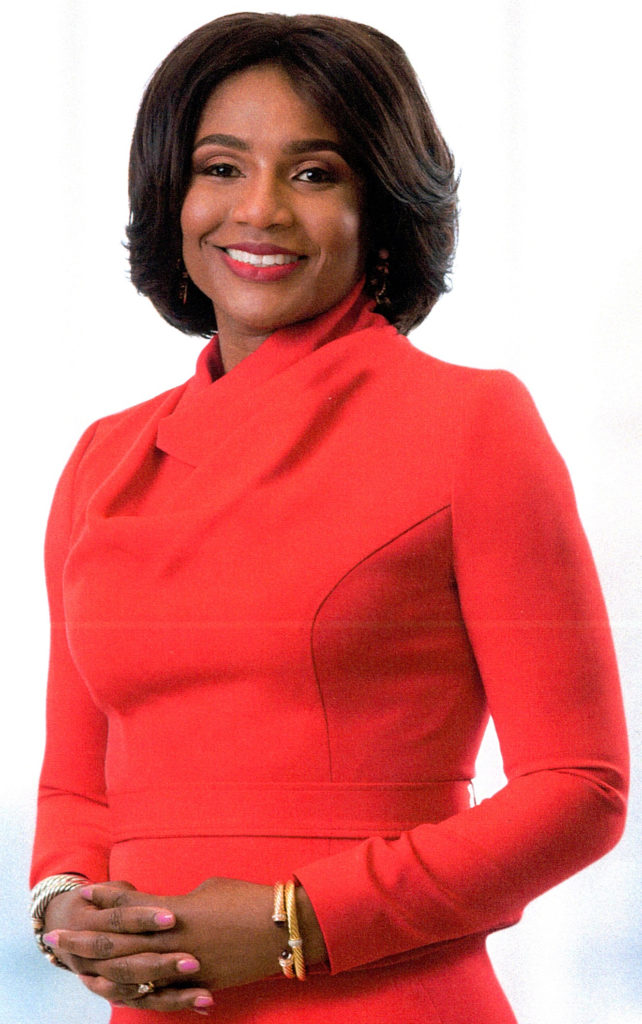
Look no further than Clark, who attended a Louisiana high school that still had separate white and black proms. She was an early beneficiary of sponsorship, though it was not an official initiative back in 1994.
Clark, who took over as chair of the global law firm Friday and became the highest ranking African American woman to lead a top 50 international corporate law firm, said that her success as a lawyer is the direct result of sponsorship at Norton Rose Fulbright.
“My first year, I suffered from isolation from being the only one,” she told The Texas Lawbook in an interview. “I thought I needed a mentor who looked like me – a black woman. I was wrong.”
Instead, an older white employment law partner named Robert Bambace stepped forward.
“He made me go to black-tie events where I was the only black woman there and the youngest person there by 40 years,” Clark said. “He saw something in me. When I disappointed him, he let me know. I did not realize he was sponsoring me at the time, but now I know that I had the best sponsor. He was my secret sauce.”
Clark said that it is important to know the difference between mentoring someone and sponsoring them.
“It is so much easier to help people who are like you,” she said. “A mentor is there to coach you in life decisions. It is a comfort relationship. A sponsor is totally different. You may have nothing in common with your sponsor. A sponsor goes out of the way to help you. A sponsor, instead of taking credit for business, gives the credit to you. Sponsorships cost something. It can be detrimental to the sponsor.”
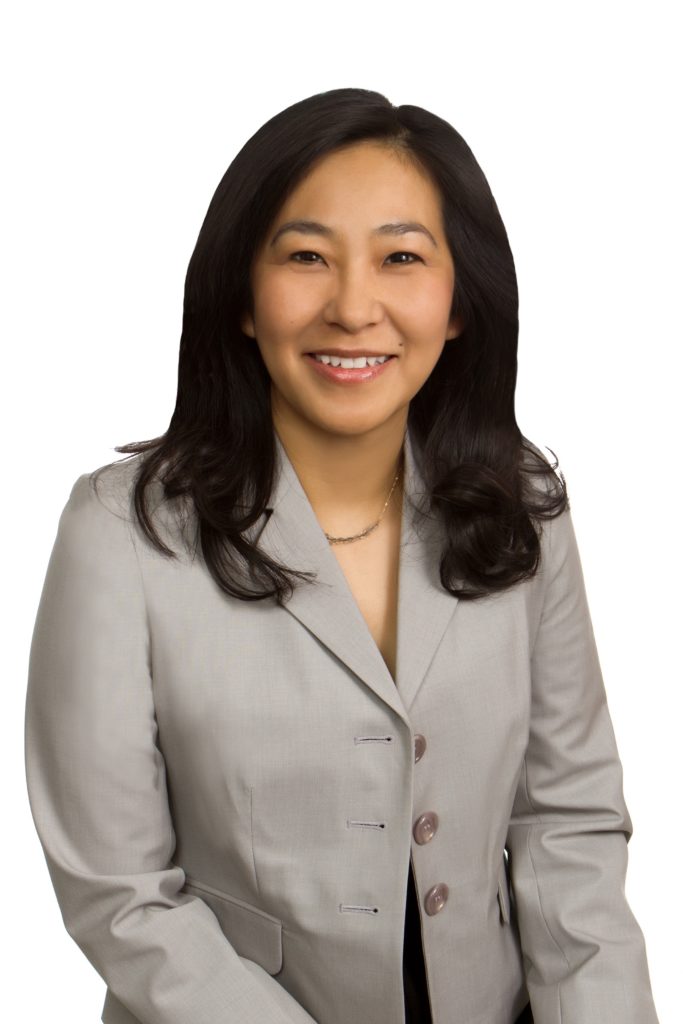
Clark has now sponsored several younger lawyers, including Torrence.
Norton Rose Fulbright intellectual property law partner Gina Shishima, who sits on the firm’s management committee with Clark, calls sponsorship “the game changer” for addressing diversity.
“A mentor is someone who takes you by the hand and guides you through the crowd,” said Shishima, who also serves as the firm’s chief strategy and operation’s partner. “A sponsor puts you on her or his shoulders and lifts [you] up.”
Shishima, whose parents were born in a Japanese internment camp in California, was the first woman to join Norton’s Rose Fulbright’s IP practice in Austin. She has a Ph.D. in molecular biology. Her sponsor was Austin partner David Parker, also a white male.
“David gave me opportunities. He was always my advocate. He was my champion,” she said.
Former Fulbright lawyer Veronica Foley, who is now the general counsel at Houston-based Precision Drilling, said that the firm has benefited over the years from several progressive male leaders who wanted more inclusion and diversity.
“When I was a young lawyer at Fulbright, there were not that many female role models,” Foley said. “It was some of the men who stepped up, and that was the critical first step. And now, the firm is producing some of the best and most successful women partners practicing law.”
Foley points out that Norton Rose Fulbright elected Linda Addison as its U.S. managing partner in 2013, which was a significant step forward. Two other large Texas law firms, Locke Lord and Thompson & Knight, also had women managing partners during the past decade.
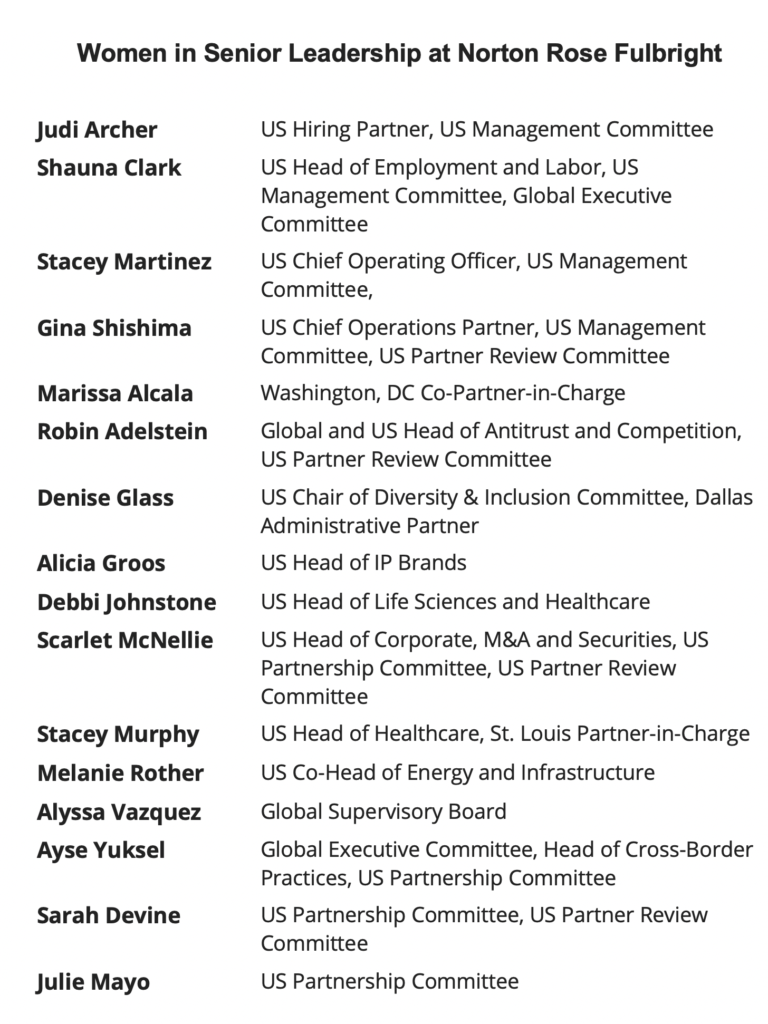
Shishima and Clark agree that having four women on the firm’s management takes the pressure off each of them to feel as if they are the sole voice for women lawyers with other leaders.
“Women and minorities sometimes have the burden of their gender and race on our shoulders,” said Norton Rose Fulbright litigation partner Stacey Martinez, who serves on the firm’s management committee and is also its chief operating officer.
Martinez, who had now-retired partner Stephanie Smith as her sponsor, said that having four women on the management committee “paints a hopeful picture for women and ethnic minorities” about their potential future as lawyers and leaders.
“It says we are moving in the right direction,” she said. “Others can look at the women on the management committee and see that being a woman and a minority doesn’t prevent you from leadership.”
But the four women partners are quick to point out that they have differing opinions on many matters.
“We each did it differently, which is good because it shows there are different roads to get to the same place,” Shishima said.

The fourth woman on the firm’s U.S. management is New York litigation partner Judith Archer.
“I believe having a critical mass of diverse partners on our management committee has had a direct impact on firm policy and leadership,” Archer said, “because a truly inclusive culture – where women are not the exception in leadership – results in a wider variety of different perspectives and experiences brought to bear on policy decisions, recruiting and advancement.”
Norton Rose Fulbright’s U.S. managing partner Jeff Cody said that having four women on the management committee is “one way to lead by example and demonstrate to our lawyers and staff that we are deeply committed to these goals.”
Cody said it also helps in recruiting new talent and obtaining new business.
“Diversity matters to law students,” he said. “It matters to clients and it matters to us.”
Texas Lawbook data shows that Norton Rose Fulbright’s push for diversity and inclusion has coincided with an increase in legal work for the firm’s lawyers in Texas.

In 2019, Norton Rose Fulbright’s Texas operations generated $397 million in revenues – a 23% jump from 2017. The firm’s revenues per lawyer went from $700,000 in 2015 to $1,015,000 in 2019. And Texas lawyers at the firm saw their profits per partner jump from $940,000 in 2018 to $1.28 million a year later, according to Texas Lawbook research.
“Law firms are not ‘not for profits.’ At the end of the day, it is about the business you bring in,” Clark said. “My frustration is with the people who don’t want to do the work and they don’t want to make the sacrifices, but they still want to reap the rewards. Part of sponsorship is being brutally honest with those you are sponsoring.”
Foley, the Precision Drilling general counsel, said business leaders today want diversity from their outside vendors, including law firms.
“For me and so many other corporate general counsel, diversity is super important when it comes to the firms we hire,” Foley said. “I always demand that at least one woman play a significant role on each matter.”
Despite the progress, the Norton Rose Fulbright lawyers readily admit there remains much need for improvement.
“A lot of the ceilings have been broken. Yet there is still not parity,” Shishima said. “To be clear, we still don’t have enough women partners. The goal is parity, and we – the firm and the profession – are not there yet.”
